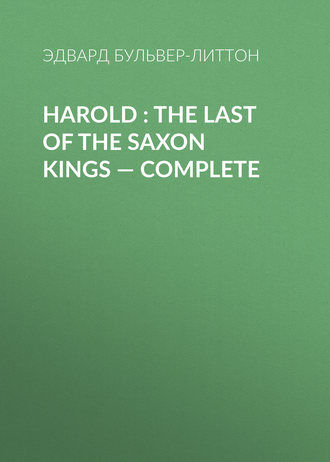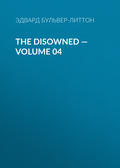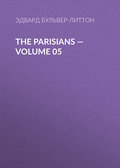
Эдвард Бульвер-Литтон
Harold : the Last of the Saxon Kings — Complete
“All this is a Norman fable,” said the Thegn of Kent, with a disturbed visage; “and Godwin cleared himself on oath of all share in the foul murder of Alfred.”
“The oath, I have heard, was backed,” said the knight drily, “by a present to Hardicanute, who after the death of King Harold resolved to avenge the black butchery; a present, I say, of a gilt ship, manned by fourscore warriors with gold-hilted swords, and gilt helms.—But let this pass.”
“Let it pass,” echoed Vebba with a sigh. “Bloody were those times, and unholy their secrets.”
“Yet answer me still, why love you Earl Godwin? He hath changed sides from party to party, and in each change won lordships and lands. He is ambitious and grasping, ye all allow; for the ballads sung in your streets liken him to the thorn and the bramble, at which the sheep leaves his wool. He is haughty and overbearing. Tell me, O Saxon, frank Saxon, why you love Godwin the Earl? Fain would I know; for, please the saints (and you and your Earl so permitting), I mean to live and die in this merrie England; and it would be pleasant to learn that I have but to do as Earl Godwin, in order to win love from the English.”
The stout Vebba looked perplexed; but after stroking his beard thoughtfully, he answered thus:
“Though of Kent, and therefore in his earldom, I am not one of Godwin’s especial party; for that reason was I chosen his bode. Those who are under him doubtless love a chief liberal to give and strong to protect. The old age of a great leader gathers reverence, as an oak gathers moss. But to me, and those like me, living peaceful at home, shunning courts, and tempting not broils, Godwin the man is not dear—it is Godwin the thing.”
“Though I do my best to know your language,” said the knight, “ye have phrases that might puzzle King Solomon. What meanest thou by ‘Godwin the thing’?”
“That which to us Godwin only seems to uphold. We love justice; whatever his offences, Godwin was banished unjustly. We love our laws; Godwin was dishonoured by maintaining them. We love England, and are devoured by strangers; Godwin’s cause is England’s, and—stranger, forgive me for not concluding.”
Then examining the young Norman with a look of rough compassion, he laid his large hand upon the knight’s shoulder and whispered:
“Take my advice—and fly.”
“Fly!” said De Graville, reddening. “Is it to fly, think you, that I have put on my mail, and girded my sword?”
“Vain—vain! Wasps are fierce, but the swarm is doomed when the straw is kindled. I tell you this—fly in time, and you are safe; but let the King be so misguided as to count on arms, and strive against yon multitude, and verily before nightfall not one Norman will be found alive within ten miles of the city. Look to it, youth! Perhaps thou hast a mother—let her not mourn a son!”
Before the Norman could shape into Saxon sufficiently polite and courtly his profound and indignant disdain of the counsel, his sense of the impertinence with which his shoulder had been profaned, and his mother’s son had been warned, the nuncius was again summoned into the presence-chamber. Nor did he return into the ante-room, but conducted forthwith from the council—his brief answer received—to the stairs of the palace, he reached the boat in which he had come, and was rowed back to the ship that held the Earl and his sons.
Now this was the manoeuvre of Godwin’s array. His vessels having passed London Bridge, had rested awhile on the banks of the Southward suburb (Suth-weorde)—since called Southwark—and the King’s ships lay to the north; but the fleet of the Earl’s, after a brief halt, veered majestically round, and coming close to the palace of Westminster, inclined northward, as if to hem the King’s ships. Meanwhile the land forces drew up close to the Strand, almost within bow-shot of the King’s troops, that kept the ground inland; thus Vebba saw before him, so near as scarcely to be distinguished from each other, on the river the rival fleets, on the shore the rival armaments.
High above all the vessels towered the majestic bark, or aesca, that had borne Harold from the Irish shores. Its fashion was that of the ancient sea-kings, to one of whom it had belonged. Its curved and mighty prow, richly gilded, stood out far above the waves: the prow, the head of the sea-snake; the stern its spire; head and spire alike glittering in the sun.
The boat drew up to the lofty side of the vessel, a ladder was lowered, the nuncius ascended lightly and stood on deck. At the farther end grouped the sailors, few in number, and at respectful distance from the Earl and his sons.
Godwin himself was but half armed. His head was bare, nor had he other weapon of offence than the gilt battle-axe of the Danes—weapon as much of office as of war; but his broad breast was covered with the ring mail of the time. His stature was lower than that of any of his sons; nor did his form exhibit greater physical strength than that of a man, well shaped, robust, and deep of chest, who still preserved in age the pith and sinew of mature manhood. Neither, indeed, did legend or fame ascribe to that eminent personage those romantic achievements, those feats of purely animal prowess, which distinguished his rival, Siward. Brave he was, but brave as a leader; those faculties in which he appears to have excelled all his contemporaries, were more analogous to the requisites of success in civilised times, than those which won renown of old. And perhaps England was the only country then in Europe which could have given to those faculties their fitting career. He possessed essentially the arts of party; he knew how to deal with vast masses of mankind; he could carry along with his interests the fervid heart of the multitude; he had in the highest degree that gift, useless in most other lands—in all lands where popular assemblies do not exist—the gift of popular eloquence. Ages elapsed, after the Norman conquest, ere eloquence again became a power in England. 80
But like all men renowned for eloquence, he went with the popular feeling of his times; he embodied its passions, its prejudices—but also that keen sense of self-interest, which is the invariable characteristic of a multitude. He was the sense of the commonalty carried to its highest degree. Whatever the faults, it may be the crimes, of a career singularly prosperous and splendid, amidst events the darkest and most terrible,—shining with a steady light across the thunder-clouds,—he was never accused of cruelty or outrage to the mass of the people. English, emphatically, the English deemed him; and this not the less that in his youth he had sided with Canute, and owed his fortunes to that king; for so intermixed were Danes and Saxons in England, that the agreement which had given to Canute one half the kingdom had been received with general applause; and the earlier severities of that great prince had been so redeemed in his later years by wisdom and mildness—so, even in the worst period of his reign, relieved by extraordinary personal affability, and so lost now in men’s memories by pride in his power and fame,—that Canute had left behind him a beloved and honoured name 81, and Godwin was the more esteemed as the chosen counsellor of that popular prince. At his death, Godwin was known to have wished, and even armed, for the restoration of the Saxon line; and only yielded to the determination of the Witan, no doubt acted upon by the popular opinion. Of one dark crime he was suspected, and, despite his oath to the contrary, and the formal acquittal of the national council, doubt of his guilt rested then, as it rests still, upon his name; viz., the perfidious surrender of Alfred, Edward’s murdered brother.
But time had passed over the dismal tragedy; and there was an instinctive and prophetic feeling throughout the English nation, that with the House of Godwin was identified the cause of the English people. Everything in this man’s aspect served to plead in his favour. His ample brows were calm with benignity and thought; his large dark blue eyes were serene and mild, though their expression, when examined, was close and inscrutable. His mien was singularly noble, but wholly without formality or affected state; and though haughtiness and arrogance were largely attributed to him, they could be found only in his deeds, not manner—plain, familiar, kindly to all men, his heart seemed as open to the service of his countrymen as his hospitable door to their wants.
Behind him stood the stateliest group of sons that ever filled with pride a father’s eye. Each strikingly distinguished from the other, all remarkable for beauty of countenance and strength of frame.
Sweyn, the eldest 82, had the dark hues of his mother the Dane: a wild and mournful majesty sat upon features aquiline and regular, but wasted by grief or passion; raven locks, glossy even in neglect, fell half over eyes hollow in their sockets, but bright, though with troubled fire. Over his shoulder he bore his mighty axe. His form, spare, but of immense power, was sheathed in mail, and he leant on his great pointed Danish shield. At his feet sate his young son Haco, a boy with a countenance preternaturally thoughtful for his years, which were yet those of childhood.
Next to him stood the most dreaded and ruthless of the sons of Godwin—he, fated to become to the Saxon what Julian was to the Goth. With his arms folded on his breast stood Tostig; his face was beautiful as a Greek’s, in all save the forehead, which was low and lowering. Sleek and trim were his bright chestnut locks; and his arms were damascened with silver, for he was one who loved the pomp and luxury of war.
Wolnoth, the mother’s favourite, seemed yet in the first flower of youth, but he alone of all the sons had something irresolute and effeminate in his aspect and bearing; his form, though tall, had not yet come to its full height and strength; and, as if the weight of mail were unusual to him, he leant with both hands upon the wood of his long spear. Leofwine, who stood next to Wolnoth, contrasted him notably; his sunny locks wreathed carelessly over a white unclouded brow, and the silken hair on the upper lip quivered over arch lips, smiling, even in that serious hour.
At Godwin’s right hand, but not immediately near him, stood the last of the group, Gurth and Harold. Gurth had passed his arm over the shoulder of his brother, and, not watching the nuncius while he spoke, watched only the effect his words produced on the face of Harold. For Gurth loved Harold as Jonathan loved David. And Harold was the only one of the group not armed; and had a veteran skilled in war been asked who of that group was born to lead armed men, he would have pointed to the man unarmed.
“So what says the King?” asked Earl Godwin.
“This; he refuses to restore thee and thy sons, or to hear thee, till thou hast disbanded thine army, dismissed thy ships, and consented to clear thyself and thy house before the Witanagemot.”
A fierce laugh broke from Tostig; Sweyn’s mournful brow grew darker; Leofwine placed his right hand on his ateghar; Wolnoth rose erect; Gurth kept his eyes on Harold, and Harold’s face was unmoved.
“The King received thee in his council of war,” said Godwin, thoughtfully, “and doubtless the Normans were there. Who were the Englishmen most of mark?”
“Siward of Northumbria, thy foe.”
“My sons,” said the Earl, turning to his children, and breathing loud as if a load were off his heart; “there will be no need of axe or armour to-day. Harold alone was wise,” and he pointed to the linen tunic of the son thus cited.
“What mean you, Sir Father?” said Tostig, imperiously. “Think you to——”
“Peace, son, peace;” said Godwin, without asperity, but with conscious command. “Return, brave and dear friend,” he said to Vebba, “find out Siward the Earl; tell him that I, Godwin, his foe in the old time, place honour and life in his hands, and what he counsels that will we do.—Go.”
The Kent man nodded, and regained his boat. Then spoke Harold.
“Father, yonder are the forces of Edward; as yet without leaders, since the chiefs must still be in the halls of the King. Some fiery Norman amongst them may provoke an encounter; and this city of London is not won, as it behoves us to win it, if one drop of English blood dye the sword of one English man. Wherefore, with your leave, I will take boat, and land. And unless I have lost in my absence all right here in the hearts of our countrymen, at the first shout from our troops which proclaims that Harold, son of Godwin, is on the soil of our fathers, half yon array of spears and helms pass at once to our side.”
“And if not, my vain brother?” said Tostig, gnawing his lip with envy.
“And if not, I will ride alone into the midst of them, and ask what Englishmen are there who will aim shaft or spear at this breast, never mailed against England!”
Godwin placed his hand on Harold’s head, and the tears came to those close cold eyes.
“Thou knowest by nature what I have learned by art. Go, and prosper. Be it as thou wilt.”
“He takes thy post, Sweyn—thou art the elder,” said Tostig, to the wild form by his side.
“There is guilt on my soul, and woe in my heart,” answered Sweyn, moodily. “Shall Esau lose his birthright, and Cain retain it?” So saying, he withdrew, and, reclining against the stern of the vessel, leant his face upon the edge of his shield.
Harold watched him with deep compassion in his eyes, passed to his side with a quick step, pressed his hand, and whispered, “Peace to the past, O my brother!”
The boy Haco, who had noiselessly followed his father, lifted his sombre, serious looks to Harold as he thus spoke; and when Harold turned away, he said to Sweyn, timidly, “He, at least, is ever good to thee and to me.”
“And thou, when I am no more, shalt cling to him as thy father, Haco,” answered Sweyn, tenderly smoothing back the child’s dark locks.
The boy shivered; and, bending his head, murmured to himself, “When thou art no more! No more? Has the Vala doomed him, too? Father and son, both?”
Meanwhile, Harold had entered the boat lowered from the sides of the aesca to receive him; and Gurth, looking appealingly to his father, and seeing no sign of dissent, sprang down after the young Earl, and seated himself by his side. Godwin followed the boat with musing eyes.
“Small need,” said he, aloud, but to himself, “to believe in soothsayers, or to credit Hilda the saga, when she prophesied, ere we left our shores, that Harold—” He stopped short, for Tostig’s wrathful exclamation broke on his reverie.
“Father, father! My blood surges in my ears, and boils in my heart, when I hear thee name the prophecies of Hilda in favour of thy darling. Dissension and strife in our house have they wrought already; and if the feuds between Harold and me have sown grey in thy locks, thank thyself when, flushed with vain soothsayings for thy favoured Harold, thou saidst, in the hour of our first childish broil, ‘Strive not with Harold; for his brothers will be his men.’”
“Falsify the prediction,” said Godwin, calmly; “wise men may always make their own future, and seize their own fates. Prudence, patience, labour, valour; these are the stars that rule the career of mortals.”
Tostig made no answer; for the splash of oars was near, and two ships, containing the principal chiefs that had joined Godwin’s cause, came alongside the Runic aesca to hear the result of the message sent to the King. Tostig sprang to the vessel’s side, and exclaimed, “The King, girt by his false counsellors, will hear us not, and arms must decide between us.”
“Hold, hold! malignant, unhappy boy!” cried Godwin, between his grinded teeth, as a shout of indignant, yet joyous ferocity broke from the crowded ships thus hailed. “The curse of all time be on him who draws the first native blood in sight of the altars and hearths of London! Hear me, thou with the vulture’s blood-lust, and the peacock’s vain joy in the gaudy plume! Hear me, Tostig, and tremble. If but by one word thou widen the breach between me and the King, outlaw thou enterest England, outlaw shalt thou depart—for earldom and broad lands; choose the bread of the stranger, and the weregeld of the wolf!”
The young Saxon, haughty as he was, quailed at his father’s thrilling voice, bowed his head, and retreated sullenly. Godwin sprang on the deck of the nearest vessel, and all the passions that Tostig had aroused, he exerted his eloquence to appease.
In the midst of his arguments, there rose from the ranks on the strand, the shout of “Harold! Harold the Earl! Harold and Holy Crosse!” And Godwin, turning his eye to the King’s ranks, saw them agitated, swayed, and moving; till suddenly, from the very heart of the hostile array, came, as by irresistible impulse, the cry, “Harold, our Harold! All hail, the good Earl!”
While this chanced without,—within the palace, Edward had quitted the presence-chamber, and was closeted with Stigand, the bishop. This prelate had the more influence with Edward, inasmuch as though Saxon, he was held to be no enemy to the Normans, and had, indeed, on a former occasion, been deposed from his bishopric on the charge of too great an attachment to the Norman queen-mother Emma 83. Never in his whole life had Edward been so stubborn as on this occasion. For here, more than his realm was concerned, he was threatened in the peace of his household, and the comfort of his tepid friendships. With the recall of his powerful father-in-law, he foresaw the necessary reintrusion of his wife upon the charm of his chaste solitude. His favourite Normans would be banished, he should be surrounded with faces he abhorred. All the representations of Stigand fell upon a stern and unyielding spirit, when Siward entered the King’s closet.
“Sir, my King,” said the great son of Beorn, “I yielded to your kingly will in the council, that, before we listened to Godwin, he should disband his men, and submit to the judgment of the Witan. The Earl hath sent to me to say, that he will put honour and life in my keeping, and abide by my counsel. And I have answered as became the man who will never snare a foe, or betray a trust.”
“How hast thou answered?” asked the King.
“That he abide by the laws of England; as Dane and Saxon agreed to abide in the days of Canute; that he and his sons shall make no claim for land or lordship, but submit all to the Witan.”
“Good,” said the King; “and the Witan will condemn him now, as it would have condemned when he shunned to meet it.”
“And the Witan now,” returned the Earl emphatically, “will be free, and fair, and just.”
“And meanwhile, the troops——”
“Will wait on either side; and if reason fail, then the sword,” said Siward.
“This I will not hear,” exclaimed Edward; when the tramp of many feet thundered along the passage; the door was flung open, and several captains (Norman as well as Saxon) of the King’s troops rushed in, wild, rude, and tumultuous.
“The troops desert! half the ranks have thrown down their arms at the very name of Harold!” exclaimed the Earl of Hereford. “Curses on the knaves!”
“And the lithsmen of London,” cried a Saxon thegn, “are all on his side, and marching already through the gates.”
“Pause yet,” whispered Stigand; “and who shall say, this hour to-morrow, if Edward or Godwin reign on the throne of Alfred?”
His stern heart moved by the distress of his King, and not the less for the unwonted firmness which Edward displayed, Siward here approached, knelt, and took the King’s hand.
“Siward can give no niddering counsel to his King; to save the blood of his subjects is never a king’s disgrace. Yield thou to mercy, Godwin to the law!”
“Oh for the cowl and cell!” exclaimed the Prince, wringing his hands. “Oh Norman home, why did I leave thee?” He took the cross from his breast, contemplated it fixedly, prayed silently but with fervour, and his face again became tranquil.
“Go,” he said, flinging himself on his seat in the exhaustion that follows passion, “go, Siward, go, Stigand, deal with things mundane as ye will.”
The bishop, satisfied with this reluctant acquiescence, seized Siward by the arm and withdrew him from the closet. The captains remained a few moments behind, the Saxons silently gazing on the King, the Normans whispering each other, in great doubt and trouble, and darting looks of the bitterest scorn at their feeble benefactor. Then, as with one accord, these last rushed along the corridor, gained the hall where their countrymen yet assembled, and exclaimed, “A toute bride! Franc etrier!—All is lost but life!—God for the first man,—knife and cord for the last!”
Then, as the cry of fire, or as the first crash of an earthquake, dissolves all union, and reduces all emotion into one thought of self-saving, the whole conclave, crowding pell-mell on each other, bustled, jostled, clamoured to the door—happy he who could find horse, palfrey,—even monk’s mule! This way, that way, fled those lordly Normans, those martial abbots, those mitred bishops—some singly, some in pairs; some by tens, and some by scores; but all prudently shunning association with those chiefs whom they had most courted the day before, and who, they now knew, would be the main mark for revenge; save only two, who yet, from that awe of the spiritual power which characterised the Norman, who was already half monk, half soldier (Crusader and Templar before Crusades were yet preached, or the Templars yet dreamed of),—even in that hour of selfish panic rallied round them the prowest chivalry of their countrymen, viz., the Bishop of London and the Archbishop of Canterbury. Both these dignitaries, armed cap-a-pie, and spear in hand, headed the flight; and good service that day, both as guide and champion, did Mallet de Graville. He led them in a circuit behind both armies, but being intercepted by a new body, coming from the pastures of Hertfordshire to the help of Godwin, he was compelled to take the bold and desperate resort of entering the city gates. These were wide open; whether to admit the Saxon Earls, or vomit forth their allies, the Londoners. Through these, up the narrow streets, riding three abreast, dashed the slaughtering fugitives; worthy in flight of their national renown, they trampled down every obstacle. Bodies of men drew up against them at every angle, with the Saxon cry of “Out—Out!” “Down with the outland men!” Through each, spear pierced, and sword clove, the way. Red with gore was the spear of the prelate of London; broken to the hilt was the sword militant in the terrible hand of the Archbishop of Canterbury. So on thy rode, so on they slaughtered—gained the Eastern Gate, and passed with but two of their number lost.
The fields once gained, for better precaution they separated. Some few, not quite ignorant of the Saxon tongue, doffed their mail, and crept through forest and fell towards the sea-shore; others retained steed and arms, but shunned equally the high roads. The two prelates were among the last; they gained, in safety, Ness, in Essex, threw themselves into an open, crazy, fishing-boat, committed themselves to the waves, and, half drowned and half famished, drifted over the Channel to the French shores. Of the rest of the courtly foreigners, some took refuge in the forts yet held by their countrymen; some lay concealed in creeks and caves till they could find or steal boats for their passage. And thus, in the year of our Lord 1052, occurred the notable dispersion and ignominious flight of the counts and vavasours of great William the Duke!







